Table of Contents
- The Brain’s Nutritional Needs
- Neurotransmitter Production
- Antioxidant Defense
- Nervous System Function
- Blood Flow and Oxygenation
- Omega-3 Fatty Acids
- Antioxidants
- B Vitamins
- Amino Acids
- Iron
- Vitamin D
- Incorporating Brain-Boosting Foods into Your Diet
- Leafy Green Salads
- Fatty Fish Fridays
- Berries Galore
- Nutty Snacking
- Whole Grain Goodness
- Egg-cellent Breakfasts
- Hydration Matters
- A Holistic Approach to Brain Health
The human brain, a complex and remarkable organ, is the epicenter of our thoughts, emotions and actions. It’s a dynamic powerhouse that requires proper nourishment to function optimally. While mental exercises and challenges are essential for cognitive health, the role of nutrition should not be underestimated. In this article, we’ll explore the world of brain-boosting foods, uncovering the essential nutrients that support cognitive function and promote a sharp and agile mind.
The human brain, a marvel of nature, stands as the control center of our existence, orchestrating our thoughts, emotions and actions with astonishing complexity. It’s a dynamic powerhouse, a biological supercomputer that processes an immense amount of information every day. Yet, for all its capabilities, this remarkable organ relies on proper nourishment to function optimally. While mental exercises and challenges are unquestionably important for cognitive health, we must not overlook the pivotal role of nutrition in sustaining and enhancing the brilliance of our minds. In this article, we’ll embark on a captivating journey into the realm of brain-boosting foods, delving deep into the world of essential nutrients that support cognitive function and promote a sharp and agile intellect.
Our brains, in their ceaseless activity, consume a significant amount of energy and require a constant supply of nutrients to maintain peak performance. Among these nutrients, omega-3 fatty acids stand out as true brain superstars. Found abundantly in fatty fish like salmon, walnuts and flaxseeds, omega-3s are instrumental in building and maintaining the structural integrity of brain cell membranes. They also play a crucial role in promoting healthy blood flow to the brain, ensuring that it receives the oxygen and nutrients it needs to function optimally.
Antioxidants, another group of brain-boosting champions, are abundant in colorful fruits and vegetables. These compounds help protect brain cells from oxidative stress and inflammation, which can lead to cognitive decline over time. Berries, in particular, are packed with antioxidants, making them delicious allies in the battle against cognitive aging.
The B vitamins, including folate, B6 and B12, are essential for brain health as well. They play key roles in the production of neurotransmitters, the chemical messengers that enable communication between brain cells. Leafy greens, legumes and fortified cereals are excellent sources of these vital nutrients.
And let’s not forget about the role of complex carbohydrates in fueling our brains. Foods like whole grains, oats and brown rice provide a steady supply of glucose, the brain’s preferred energy source. This helps maintain focus and mental clarity throughout the day.
As we explore this fascinating world of brain-boosting foods, we’ll uncover not only the scientific foundations but also the delicious ways to incorporate these nutrients into our daily diets. With the right nutrition, we can harness the full potential of our brains, promoting cognitive function, memory retention and mental agility. So, join us on this journey to nourish our most prized possession—the incredible human brain—and unlock its limitless potential for creativity, learning and intellectual growth.
You can also read more about this here: The Effects of Nutritional Interventions on the Cognitive …
The Brain’s Nutritional Needs
The brain is a hungry organ, requiring a constant supply of nutrients to fuel its intricate processes. These nutrients play various roles in maintaining brain health, including:
The brain is a marvel of nature, a ceaselessly active organ that demands a steady influx of nutrients to support its intricate and vital functions. It operates like a well-orchestrated symphony, with each nutrient playing a unique role in maintaining and optimizing brain health. Let’s explore the multifaceted contributions of these nutrients:
Energy Production: Glucose, derived from carbohydrates, is the primary energy source for the brain. It fuels the rapid firing of neurons, enabling cognitive functions such as thinking, memory and decision-making. Ensuring a consistent supply of carbohydrates in your diet helps sustain mental alertness and focus.
Antioxidant Defense: Antioxidants like vitamins C and E, as well as minerals like selenium, protect the brain from oxidative stress caused by free radicals. By neutralizing these harmful molecules, antioxidants safeguard brain cells from damage and support cognitive longevity.
Neurotransmitter Synthesis: Amino acids from proteins are the building blocks of neurotransmitters, the chemical messengers that enable communication between brain cells. For example, tryptophan is essential for serotonin production, which influences mood and emotional well-being. A balanced intake of protein ensures a healthy supply of these crucial neurotransmitters.
Healthy Fats for Structure: Omega-3 fatty acids, found in fatty fish like salmon and flaxseeds, are integral to the structure of brain cell membranes. They enhance cell-to-cell communication, contributing to improved memory and cognitive function. These healthy fats are also thought to reduce the risk of cognitive decline.
Brain-Boosting Micronutrients: Certain vitamins and minerals, such as B vitamins (especially B6, B9 and B12), vitamin D and folate, are essential for cognitive development and function. They support the production of neurotransmitters, assist in DNA repair and synthesis and contribute to overall brain health.
Blood Flow Regulation: Iron, found in red meat and leafy greens, is crucial for maintaining optimal oxygen levels in the brain. It supports the production of hemoglobin, a protein that transports oxygen in the bloodstream. Sufficient oxygen supply is vital for clear thinking and mental alertness.
Neuroplasticity and Growth: Nutrients like zinc and magnesium are involved in neuroplasticity, the brain’s ability to adapt and form new connections throughout life. This process underpins learning, memory and cognitive development.
Stress Management: Adaptogenic herbs and compounds like ashwagandha and rhodiola can help manage stress and promote emotional well-being. Chronic stress can impair cognitive function and these natural remedies may support resilience.
Hydration for Brain Function: Water is fundamental to brain health. Dehydration can lead to cognitive deficits, impaired concentration and reduced cognitive performance. Staying adequately hydrated ensures that the brain functions optimally.
In summary, the brain is an extraordinary organ with diverse nutritional needs. By nurturing it with a well-balanced diet rich in essential nutrients, you provide the foundation for optimal cognitive function, emotional well-being and long-term brain health. This approach not only helps you stay sharp and focused in the present but also contributes to a healthier and more vibrant brain as you age.
Looking for more insights? You’ll find them right here in our extended coverage: Brain foods: the effects of nutrients on brain function – PMC
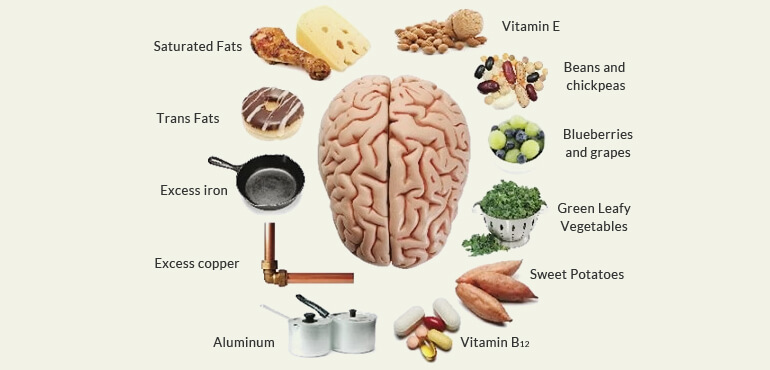
Neurotransmitter Production
Nutrients like amino acids and vitamins are crucial for the synthesis of neurotransmitters, the chemical messengers that allow communication between brain cells.
Nutrients like amino acids and vitamins play an indispensable role in maintaining the intricate communication network within our brains. This network relies on neurotransmitters, the specialized chemical messengers that enable brain cells or neurons, to exchange vital information. Here’s a closer look at how these essential nutrients support the synthesis of neurotransmitters and, in turn, influence our cognitive function and mental well-being:
Amino Acids for Neurotransmitter Building: Amino acids are the building blocks of proteins, but some of them also serve as precursors for neurotransmitters. For instance, the amino acid tryptophan is essential for the production of serotonin, a neurotransmitter that regulates mood and contributes to feelings of well-being. Likewise, tyrosine and phenylalanine are crucial for creating dopamine and norepinephrine, which play key roles in motivation, focus and stress response.
Vitamins as Cofactors: Certain vitamins act as cofactors in the enzymatic reactions that convert amino acids into neurotransmitters. For example, vitamin B6 is essential for converting tryptophan into serotonin, while vitamin C helps convert dopamine into norepinephrine. These vitamins are vital for the proper functioning of enzymes responsible for neurotransmitter synthesis.
Balanced Diet for Optimal Brain Function: To ensure that our brains have a steady supply of these amino acids and vitamins, maintaining a balanced diet is crucial. Foods rich in protein, like lean meats, fish, dairy products and legumes, provide the necessary amino acids. Meanwhile, a diet that includes a variety of fruits and vegetables ensures you receive an ample supply of vitamins, particularly those from the B-complex and vitamin C.
Mood and Cognitive Impact: The balance of neurotransmitters in the brain has a profound impact on mood, cognition and overall mental well-being. Adequate levels of serotonin are associated with feelings of happiness and contentment, while dopamine is linked to motivation and reward. An imbalance in these neurotransmitters can contribute to conditions such as depression, anxiety or attention disorders.
Neurotransmitter Regulation: Some medications used to manage mental health conditions target neurotransmitter regulation. For example, selective serotonin reuptake inhibitors (SSRIs) aim to increase serotonin levels by preventing its reabsorption in the brain. Understanding the role of nutrients in neurotransmitter synthesis highlights the importance of a well-rounded diet and, in some cases, dietary supplements as complementary strategies for mental health support.
In summary, the relationship between nutrients like amino acids and vitamins and neurotransmitter synthesis underscores the intimate connection between our dietary choices and brain function. By nourishing our bodies with the right nutrients, we not only support physical health but also promote mental well-being. A balanced diet can serve as a cornerstone of cognitive function, emotional stability and overall brain health, reinforcing the significance of making informed and wholesome food choices for a fulfilling life.
To delve further into this matter, we encourage you to check out the additional resources provided here: B Vitamins and the Brain: Mechanisms, Dose and Efficacy—A …

Antioxidant Defense
Antioxidants such as vitamins C and E, as well as selenium, help protect the brain from oxidative stress, which can damage brain cells and contribute to cognitive decline.
The role of antioxidants in safeguarding brain health is a fascinating aspect of nutrition and overall well-being. Expanding on this idea, here are some insights into how these powerful compounds offer brain protection and support cognitive function:
Oxidative Stress and Brain Health: Oxidative stress is a natural process in the body where free radicals, highly reactive molecules, can cause damage to cells, including those in the brain. Over time, this damage accumulates and is linked to various neurodegenerative conditions, such as Alzheimer’s disease and Parkinson’s disease.
Vitamin C – The Brain’s Shield: Vitamin C, also known as ascorbic acid, is a potent antioxidant. It plays a crucial role in neutralizing free radicals and protecting brain cells from oxidative damage. Regular consumption of vitamin C-rich foods, like citrus fruits and berries, can support brain health throughout life.
Vitamin E – The Brain’s Guardian: Vitamin E, a fat-soluble antioxidant, is particularly beneficial for the brain because it can protect fatty acids in cell membranes from oxidative harm. Nuts, seeds and vegetable oils are excellent sources of vitamin E and can help maintain cognitive function as you age.
Selenium – Brain and Immunity: Selenium is a trace mineral that functions as an antioxidant in the body. It not only supports brain health but also contributes to a robust immune system. By reducing oxidative stress, selenium aids in preserving cognitive function and promoting overall well-being.
Dietary Sources of Antioxidants: Including a variety of antioxidant-rich foods in your diet is essential for brain protection. Berries, dark leafy greens, nuts, seeds and colorful vegetables are just a few examples of foods that supply an array of antioxidants. A balanced diet with these foods can help maintain cognitive vitality.
Age-Related Cognitive Decline: As we age, our bodies become less efficient at neutralizing free radicals, making antioxidant-rich foods even more critical. A diet rich in antioxidants can slow the progression of age-related cognitive decline and help maintain mental sharpness.
Brain-Boosting Nutrients: In addition to antioxidants, other nutrients like omega-3 fatty acids, found in fatty fish like salmon and B vitamins, found in whole grains and leafy greens, also support brain health. A balanced diet that incorporates these nutrients provides comprehensive support for cognitive function.
Lifestyle Factors: While nutrition plays a significant role, other lifestyle factors, such as regular physical activity, mental stimulation and social engagement, also contribute to brain health. Combining a brain-boosting diet with these lifestyle practices can provide maximum cognitive benefits.
In summary, antioxidants, including vitamins C and E and selenium, act as guardians of brain health, protecting against oxidative stress and the potential cognitive decline it can trigger. A diet rich in antioxidant-rich foods and a healthy lifestyle that includes physical, mental and social engagement can collectively support optimal brain function and promote a sharper mind as you age.
Explore this link for a more extensive examination of the topic: What Do We Know About Diet and Prevention of Alzheimer’s Disease?

Nervous System Function
Essential fatty acids, particularly omega-3s, are vital for the structure and function of nerve cells, supporting cognitive processes like memory and learning.
Essential fatty acids, with a particular focus on omega-3s, play an indispensable role in the intricate web of our brain’s health and functionality. Their significance extends beyond merely being a structural component of nerve cells; they are the unsung heroes behind the scenes, orchestrating a symphony of cognitive processes that define our ability to think, remember and learn.
Memory Mastery: Omega-3 fatty acids, found abundantly in fatty fish like salmon and walnuts, are like brain fuel for memory. They enhance the brain’s ability to form and retain memories, making them vital for students, professionals and anyone interested in preserving their recollection of life’s precious moments.
Learning Luminary: The brain’s capacity to learn new information, adapt to challenges and acquire new skills relies heavily on omega-3s. These essential fats support the communication between brain cells, enhancing synaptic plasticity and boosting the brain’s learning potential. Whether you’re mastering a new language or acquiring a new hobby, omega-3s provide the cognitive foundation for your endeavors.
Mood Management: Cognitive health isn’t limited to memory and learning; it also encompasses emotional well-being. Omega-3s have been linked to mood regulation, with studies suggesting that they can help alleviate symptoms of depression and anxiety. A balanced intake of these fatty acids can contribute to a brighter, more positive outlook on life.
Neuroprotection: Omega-3s offer an added layer of protection for nerve cells, shielding them from the oxidative stress and inflammation that can lead to cognitive decline and neurodegenerative diseases. By maintaining the structural integrity of nerve cells, these fatty acids support brain health throughout life.
Childhood Development: Omega-3s are especially crucial during the early stages of life when the brain is rapidly developing. Expectant mothers who consume an adequate amount of these essential fatty acids can positively influence their child’s cognitive development, potentially leading to improved cognitive abilities, academic performance and behavior in childhood.
In summary, essential fatty acids, especially omega-3s, are the unsung champions of cognitive health. They nurture our brain cells, ensuring they function optimally and support the various cognitive processes that define our intelligence, memory and capacity to learn. Whether you’re young or young at heart, prioritizing these essential nutrients through a balanced diet can have a profound impact on your mental acuity and overall cognitive well-being.
Should you desire more in-depth information, it’s available for your perusal on this page: Baby brain food: 7 foods to fuel brain development | UCLA Health
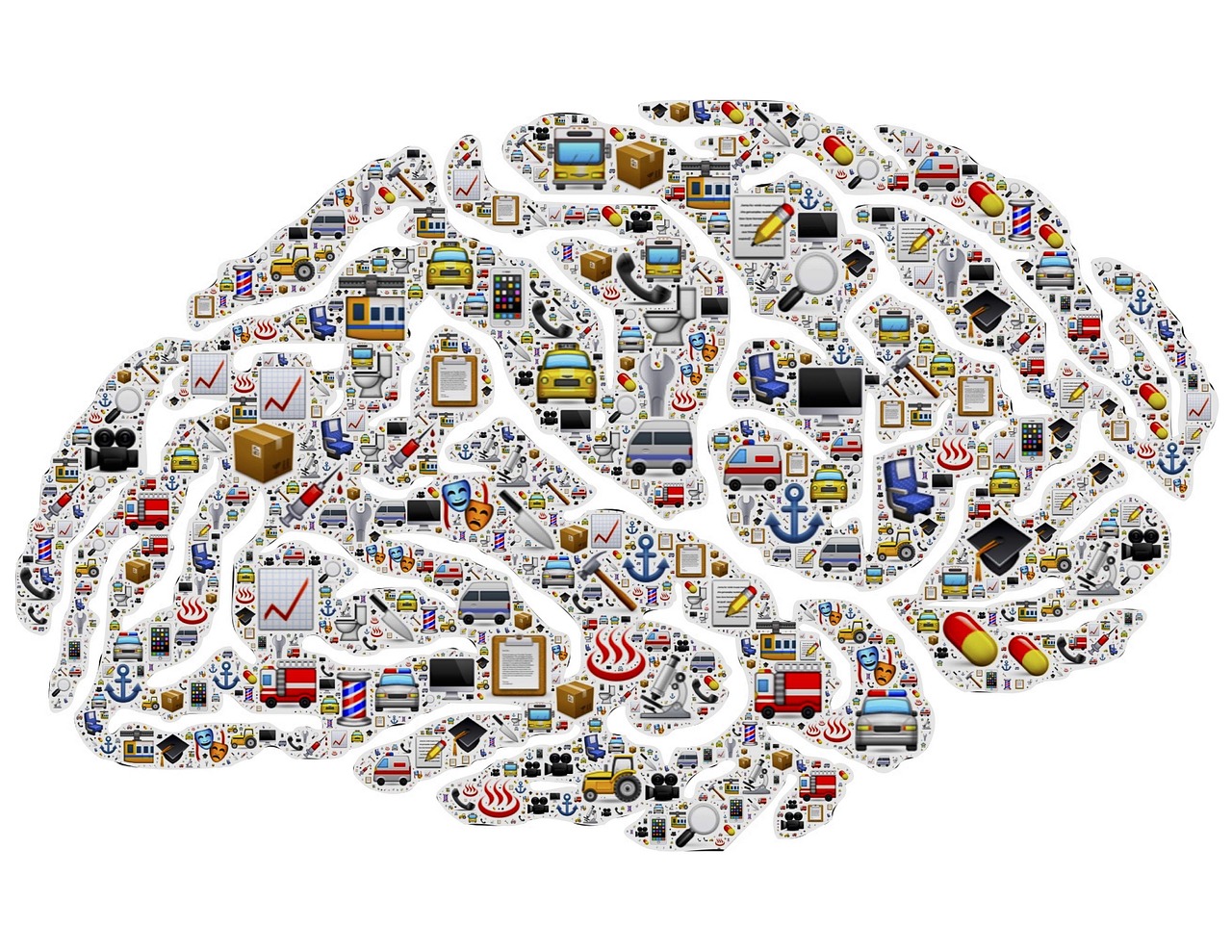
Blood Flow and Oxygenation
Nutrients like B vitamins and iron help ensure proper blood flow and oxygen delivery to the brain, enhancing cognitive performance.
The role of B vitamins and iron in supporting cognitive performance goes beyond ensuring adequate blood flow and oxygen delivery to the brain. Let’s delve deeper into how these nutrients contribute to optimal brain function:
1. B Vitamins: A Cognitive Catalyst
B vitamins, which include B1 (thiamine), B2 (riboflavin), B3 (niacin), B5 (pantothenic acid), B6 (pyridoxine), B7 (biotin), B9 (folate) and B12 (cobalamin), form a group of water-soluble vitamins that are instrumental in various aspects of cognitive health:
Neurotransmitter Production: B vitamins, particularly B6, B9 (folate) and B12, play a vital role in the synthesis of neurotransmitters like serotonin, dopamine and norepinephrine. These chemicals are essential for mood regulation, motivation and memory.
Homocysteine Regulation: Elevated levels of homocysteine, an amino acid, have been linked to cognitive decline and an increased risk of neurodegenerative diseases. B vitamins, particularly B6, B9 (folate) and B12, help regulate homocysteine levels, potentially reducing this risk.
Mental Clarity: Thiamine (B1) and riboflavin (B2) are involved in energy metabolism within brain cells, promoting mental clarity and alertness.
Brain Cell Repair: Niacin (B3) is essential for DNA repair and maintenance, ensuring the integrity of brain cells and their ability to function optimally.
Stress Reduction: Pantothenic acid (B5) contributes to the production of stress hormones, helping the brain manage stress more effectively.
Memory Enhancement: Research has shown that adequate levels of folate (B9) and cobalamin (B12) are associated with better memory performance, particularly in older adults.
2. Iron: Oxygenation and Cognitive Clarity
Iron is a mineral with a pivotal role in brain health, primarily concerning oxygenation and cognitive clarity:
Oxygen Transport: Iron is a crucial component of hemoglobin, the protein in red blood cells responsible for transporting oxygen from the lungs to the rest of the body, including the brain. Proper oxygen delivery is vital for maintaining alertness and mental acuity.
Energy Production: Iron is also involved in mitochondrial function, which is essential for energy production within brain cells. Adequate energy supports concentration, focus and overall cognitive function.
Neurotransmitter Modulation: Iron plays a role in the synthesis of neurotransmitters like dopamine, which are vital for mood regulation, motivation and cognitive performance.
Learning and Memory: Iron deficiency has been associated with cognitive impairments, particularly in tasks related to learning and memory. Ensuring sufficient iron intake is essential for optimal cognitive abilities.
It’s crucial to maintain an appropriate balance of these nutrients through a well-rounded diet to support cognitive performance. While individual nutrient needs may vary, incorporating a variety of foods rich in B vitamins and iron can help ensure that your brain receives the necessary nutrients to thrive. Additionally, consulting with a healthcare professional or registered dietitian can provide personalized guidance to meet your specific nutritional requirements for optimal cognitive function.
You can also read more about this here: Best Foods for a Healthy Brain | Northwestern Medicine

Omega-3 Fatty Acids
Found abundantly in fatty fish like salmon, mackerel and trout, as well as walnuts and flaxseeds, omega-3s are essential for brain health. They support cognitive function, reduce inflammation and may lower the risk of neurodegenerative diseases.
Omega-3 fatty acids, found abundantly in foods like fatty fish (such as salmon, mackerel and trout), as well as plant sources like walnuts and flaxseeds, are indeed a cornerstone of overall health, with their positive impact extending well beyond just brain health:
Heart Health: Omega-3s are celebrated for their cardiovascular benefits. These fatty acids help lower triglycerides, reduce blood pressure and improve overall heart function. Incorporating omega-3-rich foods into your diet can contribute to a healthier heart and a reduced risk of heart disease.
Joint Comfort: Omega-3s have anti-inflammatory properties that make them valuable in managing joint pain and stiffness. They can provide relief to individuals dealing with conditions like rheumatoid arthritis, potentially improving mobility and overall quality of life.
Eye Health: DHA, a type of omega-3 fatty acid, is a major structural component of the retina. Consuming adequate omega-3s may help maintain good eyesight and reduce the risk of age-related macular degeneration and other vision-related issues.
Mood Regulation: Emerging research suggests that omega-3s play a role in mood regulation and mental health. They may help alleviate symptoms of depression and anxiety and contribute to overall emotional well-being.
Skin Benefits: Omega-3s promote healthy skin by supporting its natural moisture barrier. They can help maintain skin elasticity and hydration, potentially reducing the appearance of fine lines and wrinkles.
Pregnancy and Infant Development: Omega-3s are crucial during pregnancy for the development of the baby’s brain and eyes. They continue to be important for infants’ cognitive development during the early years of life. Pregnant and breastfeeding women are often advised to include omega-3-rich foods in their diets.
Bone Health: Some studies suggest that omega-3s may play a role in maintaining bone density and reducing the risk of osteoporosis. While more research is needed, it’s an intriguing area of study.
Anti-Inflammatory Diet: Incorporating omega-3-rich foods into your diet can help balance the ratio of omega-3 to omega-6 fatty acids. A better balance between these fatty acids can help reduce chronic inflammation, a factor in various diseases.
Longevity: Omega-3s are associated with a longer lifespan. Their protective effects on the heart, brain and overall health contribute to increased longevity.
To reap the full range of benefits from omega-3 fatty acids, consider incorporating a variety of sources into your diet. Fatty fish remains one of the most concentrated sources, but plant-based options like walnuts, flaxseeds and chia seeds are excellent choices, particularly for vegetarians and vegans. Whether you’re aiming to support your brain, heart, joints or overall well-being, omega-3-rich foods can be a delicious and nutritious addition to your daily meals.
Additionally, you can find further information on this topic by visiting this page: Effects of Omega-3 Polyunsaturated Fatty Acids on Brain Functions …

Antioxidants
Fruits and vegetables, especially berries, leafy greens and citrus fruits, are rich sources of antioxidants. These compounds protect brain cells from damage and may help prevent cognitive decline.
Unlocking the potential of fruits and vegetables, particularly berries, leafy greens and citrus fruits, reveals a treasure trove of health benefits that go well beyond their refreshing flavors. Here’s an extended exploration of how these nutrient-packed foods support not only brain health but overall well-being:
Cognitive Agility: Antioxidants found in berries, such as blueberries, strawberries and raspberries, are hailed as cognitive champions. They have been linked to improved memory and may enhance brain function, promoting cognitive agility throughout life.
Brain Protection: Antioxidants act as guardians of your brain cells. They shield neurons from oxidative stress and free radicals, which can cause cell damage and contribute to cognitive decline. This protective mechanism helps maintain brain health as you age.
Mood Enhancement: A diet rich in fruits and vegetables has been associated with improved mood and a reduced risk of depression. The vitamins and minerals in these foods support the production of neurotransmitters like serotonin, which play a key role in mood regulation.
Inflammation Reduction: Chronic inflammation is increasingly recognized as a factor in cognitive decline. Leafy greens, such as spinach and kale, are anti-inflammatory powerhouses. They contain vitamins and phytonutrients that help reduce inflammation, safeguarding brain health.
Vitamin C Boost: Citrus fruits, including oranges, grapefruits and lemons, are vitamin C champions. This vitamin is essential for the production of collagen, which supports the integrity of blood vessels in the brain. Keeping these vessels healthy is crucial for optimal brain function.
Nutrient Diversity: The array of vitamins, minerals and phytonutrients in fruits and vegetables provides a diverse range of brain-boosting compounds. These nutrients work synergistically to promote brain health and protect against cognitive decline.
Heart-Brain Connection: A diet rich in fruits and vegetables also benefits heart health. A healthy heart means better blood flow to the brain, delivering oxygen and nutrients essential for optimal brain function.
Slowing the Aging Process: The antioxidants in these foods may help slow down the aging process, including age-related cognitive decline. Regular consumption of these nutrient-dense foods can help preserve mental sharpness as you grow older.
Diverse Culinary Delights: Fruits and vegetables offer endless culinary possibilities. From vibrant salads and smoothie bowls to hearty vegetable-based soups and fruit-infused desserts, you can enjoy these brain-boosting foods in a variety of delicious ways.
Lifelong Health: Incorporating a rainbow of fruits and vegetables into your diet isn’t just a short-term fix; it’s a recipe for lifelong health. Cultivating healthy eating habits early in life sets the stage for a vibrant and mentally agile future.
In summary, the potent combination of antioxidants, vitamins and minerals found in fruits and vegetables, with a focus on berries, leafy greens and citrus fruits, acts as a dynamic support system for brain health. By making these foods a staple in your diet, you not only enhance cognitive function but also fortify your overall well-being, contributing to a fulfilling and vibrant life at every stage.
To delve further into this matter, we encourage you to check out the additional resources provided here: Brain foods: the effects of nutrients on brain function – PMC

B Vitamins
Foods like whole grains, beans, leafy greens and lean meats provide B vitamins such as folate, B6 and B12. These vitamins are essential for neurotransmitter production and overall brain function.
Nutritional Support for a Sharp Mind: The Role of B Vitamins
When it comes to nourishing your brain and supporting optimal cognitive function, B vitamins play a starring role in the cast of essential nutrients. Here’s why foods rich in B vitamins, such as whole grains, beans, leafy greens and lean meats, are vital for maintaining a sharp mind and promoting overall brain health:
Folate (B9): Folate is a crucial B vitamin that plays a significant role in brain health. It’s essential for the synthesis of DNA and RNA, which are involved in cell division and repair, including brain cells. Folate deficiency has been linked to cognitive decline and mood disorders. Foods like leafy greens (e.g., spinach and kale), beans and lentils are excellent sources of folate.
Vitamin B6: Vitamin B6, also known as pyridoxine, is involved in the production of neurotransmitters like serotonin, dopamine and norepinephrine. These chemicals play a key role in mood regulation and cognitive function. Foods such as bananas, lean poultry and chickpeas are rich sources of vitamin B6.
Vitamin B12: Vitamin B12 is essential for nerve function and the production of myelin, a protective coating around nerve fibers. A deficiency in B12 can lead to neurological symptoms, including memory problems and cognitive decline. Lean meats, fish (particularly salmon and trout) and dairy products are notable sources of vitamin B12.
Neurotransmitter Production: B vitamins are integral to the synthesis of neurotransmitters, which are chemical messengers that transmit signals between nerve cells in the brain. Adequate levels of these neurotransmitters are crucial for mood stability, cognitive clarity and memory recall.
Methylation and Brain Health: B vitamins are involved in a process called methylation, which is essential for regulating gene expression and supporting brain health. Proper methylation helps protect against neurodegenerative conditions and cognitive decline.
Energy Production: B vitamins are involved in energy metabolism, helping convert the food you eat into the energy your brain and body need to function optimally. A well-functioning brain requires a consistent and efficient energy supply.
Stress Reduction: B vitamins, particularly B6, play a role in managing stress by helping regulate the production of stress hormones like cortisol. Balanced stress levels are essential for maintaining cognitive clarity and emotional well-being.
Homocysteine Regulation: B vitamins, specifically folate, B6 and B12, help regulate homocysteine levels in the blood. Elevated homocysteine levels are associated with an increased risk of cognitive impairment and neurodegenerative diseases.
Incorporating foods rich in B vitamins into your diet can be a proactive step toward supporting brain health and cognitive function. A well-rounded diet that includes whole grains, beans, leafy greens, lean meats and fish provides the essential B vitamins necessary for neurotransmitter production, energy metabolism and overall brain vitality. Remember that a balanced diet, along with regular physical activity and cognitive engagement, forms a holistic approach to maintaining a sharp and resilient mind throughout life.
For a comprehensive look at this subject, we invite you to read more on this dedicated page: B Vitamins and the Brain: Mechanisms, Dose and Efficacy—A …
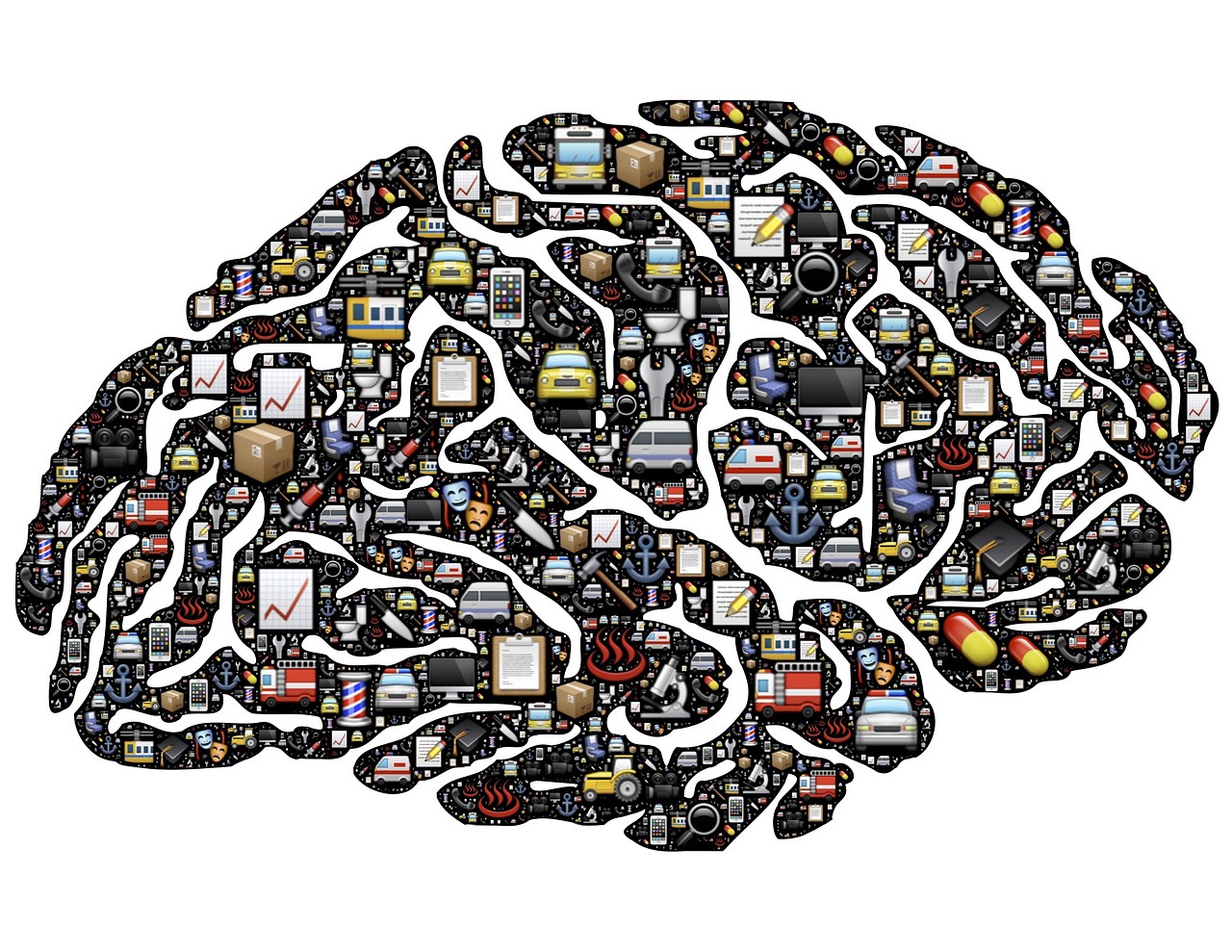
Amino Acids
Protein-rich foods like lean meats, poultry, fish, eggs and dairy products supply amino acids that serve as the building blocks of neurotransmitters like dopamine and serotonin.
Protein-rich foods constitute a vital part of our diet, supplying essential amino acids—the very building blocks critical for the creation of neurotransmitters like dopamine and serotonin. These neurotransmitters play a fundamental role in regulating our mood, emotions and overall mental well-being. By ensuring a sufficient intake of lean meats, poultry, fish, eggs and dairy, we provide our body with the necessary elements to support a balanced mental state. Thus, a well-rounded diet isn’t just about physical health—it’s also about nurturing our mental and emotional vitality through the power of nutrition.
Additionally, you can find further information on this topic by visiting this page: Brain foods: the effects of nutrients on brain function – PMC
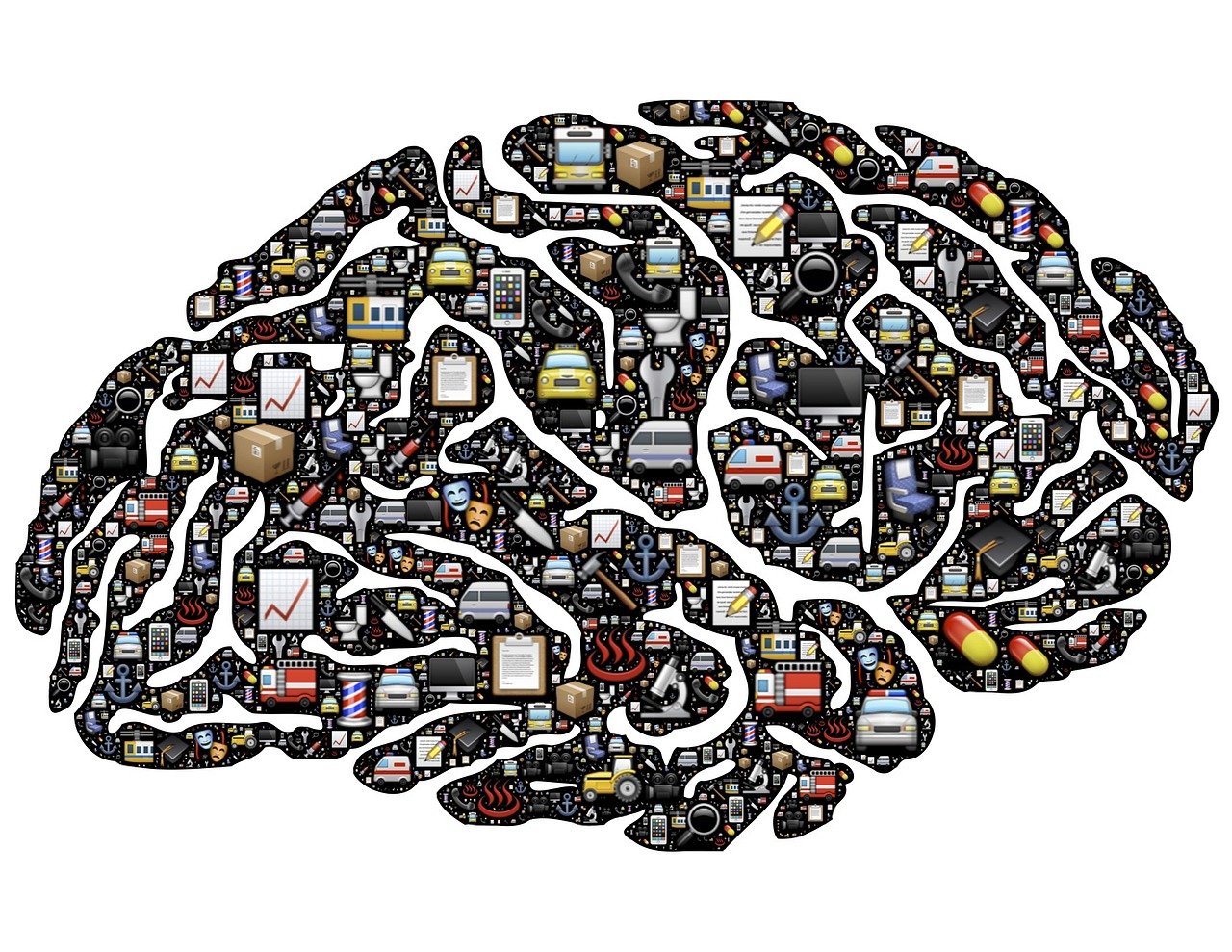
Iron
Iron-rich foods such as lean red meat, poultry, beans and fortified cereals help transport oxygen to the brain, supporting cognitive alertness and mental clarity.
When it comes to nourishing our bodies and minds, the role of iron-rich foods cannot be overstated. These dietary powerhouses, including lean red meat, poultry, beans and fortified cereals, play a crucial role in supporting not only our physical vitality but also our mental acuity.
Oxygen Transport to the Brain: Iron is a fundamental component of hemoglobin, a protein in our red blood cells responsible for transporting oxygen throughout our bodies. When we consume iron-rich foods, we ensure that our brain receives an adequate supply of oxygen. This is essential for maintaining cognitive alertness and mental clarity. A well-oxygenated brain functions at its best, allowing us to think clearly, focus effectively and make sound decisions.
Sustained Energy: Iron is also vital for energy production. When our cells receive the oxygen they need, they generate energy more efficiently. This sustained energy not only keeps us physically active but also supports our mental stamina. Whether you’re tackling a challenging project, studying for an exam or simply navigating a busy day, the energy derived from iron-rich foods can keep you feeling sharp and engaged.
Enhanced Mood: Iron plays a role in the production of serotonin, a neurotransmitter that regulates mood and emotions. Adequate iron levels contribute to the maintenance of stable mood and can help alleviate symptoms of mood disorders such as depression and anxiety. A diet rich in iron can promote emotional well-being and resilience to stress.
It’s worth noting that while iron is essential, balance is key. Consuming too little iron can lead to anemia, characterized by fatigue and cognitive difficulties. On the other hand, excessive iron intake can be harmful. Therefore, it’s advisable to consult with a healthcare professional or a registered dietitian to determine your specific iron needs based on factors such as age, gender and overall health.
Incorporating iron-rich foods into your diet is a proactive step toward nurturing not only your physical health but also your cognitive function and emotional well-being. Whether you prefer a hearty meal featuring lean red meat, a plant-based dish centered around beans or a quick and nutritious bowl of fortified cereal, these choices can make a significant difference in your vitality, alertness and mental clarity. So, embrace the power of iron-rich foods as an essential element of your diet, ensuring that your body and mind thrive together.
For a comprehensive look at this subject, we invite you to read more on this dedicated page: B Vitamins and the Brain: Mechanisms, Dose and Efficacy—A …

Vitamin D
Fatty fish, fortified dairy products and exposure to sunlight contribute to vitamin D intake. This vitamin is linked to cognitive function and may play a role in reducing the risk of cognitive decline.
Vitamin D is a nutrient with multifaceted benefits for our well-being and understanding its role in cognitive health is particularly intriguing. While it’s true that fatty fish like salmon, fortified dairy products and sunlight exposure are primary sources of vitamin D, let’s delve deeper into how this vitamin can positively impact cognitive function and potentially reduce the risk of cognitive decline.
Cognitive Vitality: Vitamin D is increasingly recognized for its role in supporting cognitive function. Studies suggest that adequate vitamin D levels may contribute to improved memory, attention and problem-solving abilities. This is especially vital as we age, as maintaining cognitive vitality becomes a priority for a fulfilling and independent life.
Brain Health: Vitamin D is believed to play a part in the protection of brain cells and the reduction of inflammation in the brain. This can be pivotal in safeguarding against neurodegenerative conditions like Alzheimer’s disease and other forms of dementia. While more research is needed, the potential for vitamin D to promote brain health is a compelling reason to ensure you meet your daily requirements.
Mood and Well-Being: Emerging evidence also suggests a connection between vitamin D and mood regulation. Deficiencies in this vitamin have been linked to an increased risk of depression and other mood disorders. Maintaining optimal vitamin D levels can contribute to a more positive and balanced emotional state, which is integral to overall cognitive well-being.
Reducing Cognitive Decline: While no single nutrient can guarantee complete protection against cognitive decline, vitamin D may be a valuable piece of the puzzle. By incorporating vitamin D-rich foods into your diet and ensuring moderate sun exposure (with proper sun protection), you’re taking proactive steps to support your cognitive health over the long term.
Personalized Health: It’s important to note that the optimal level of vitamin D can vary from person to person. Factors like age, genetics and individual health conditions can influence your specific vitamin D needs. Consulting with a healthcare professional can help you determine your ideal vitamin D intake and monitor your levels for optimal cognitive health.
Incorporating vitamin D-rich foods and responsible sun exposure into your lifestyle can contribute not only to your overall well-being but also to the preservation of your cognitive abilities as you age. It’s a small but significant investment in your long-term cognitive health and one that can pay off in the form of enhanced memory, mental clarity and a potentially reduced risk of cognitive decline.
Don’t stop here; you can continue your exploration by following this link for more details: Baby brain food: 7 foods to fuel brain development | UCLA Health
Incorporating Brain-Boosting Foods into Your Diet
Enhancing your cognitive function through nutrition is an enjoyable journey. Here are some practical tips to incorporate brain-boosting foods into your daily diet:
Embarking on the journey to enhance your cognitive function through nutrition is not only beneficial but also deliciously rewarding. It’s like giving your brain a daily dose of vitality and the path to better mental clarity and focus can be a culinary adventure. To help you on this journey, here are some practical tips to seamlessly incorporate brain-boosting foods into your daily diet:
Start with Berries: Begin your day with a burst of brain-boosting antioxidants by adding a handful of berries to your breakfast. Blueberries, in particular, are known for their cognitive benefits, thanks to their high levels of anthocyanins, which promote brain function and memory.
Opt for Omega-3 Fatty Acids: Include fatty fish like salmon, mackerel or sardines in your weekly menu. These fish are rich in omega-3 fatty acids, which are essential for brain health. If you’re not a fan of seafood, flaxseeds, chia seeds and walnuts are excellent plant-based sources of omega-3s.
Don’t Forget Leafy Greens: Leafy greens like spinach, kale and Swiss chard are packed with essential nutrients like folate and vitamin K, which help support cognitive function. Add them to salads, smoothies or sautés for a brain-boosting dose.
Embrace Whole Grains: Opt for whole grains like quinoa, oats and brown rice, as they provide a steady supply of glucose to the brain. This helps maintain energy levels and focus throughout the day.
Indulge in Dark Chocolate: Yes, you read that right! Dark chocolate, with its cocoa flavonoids, can improve blood flow to the brain, enhancing cognitive function. Choose dark chocolate with at least 70% cocoa content for maximum benefits.
Stay Hydrated: Dehydration can impair cognitive function, so make sure you’re drinking enough water throughout the day. Herbal teas and infused water can be refreshing options to keep you hydrated.
Incorporate Nuts and Seeds: Snack on almonds, walnuts or pumpkin seeds. They’re rich in vitamin E and healthy fats that support brain health. Plus, they make for a convenient, on-the-go snack.
Experiment with Turmeric: This vibrant spice contains curcumin, known for its anti-inflammatory and antioxidant properties. Add a pinch of turmeric to soups, curries or smoothies to give your brain an extra boost.
Berries for Brain Power: Incorporate more brain-boosting berries like strawberries, blackberries and raspberries into your meals. They’re packed with antioxidants that can help protect your brain from oxidative stress.
Enjoy a Cup of Green Tea: Sip on green tea throughout the day. It contains L-theanine, an amino acid that may enhance cognitive function and promote relaxation.
Remember, nourishing your brain is a long-term investment in your mental well-being. By making these brain-boosting foods a regular part of your diet, you’re not only enhancing cognitive function but also promoting overall vitality and a sharper mind for years to come. So, embrace this delightful journey of culinary exploration and savor the benefits of a happier, healthier brain.
Looking for more insights? You’ll find them right here in our extended coverage: B Vitamins and the Brain: Mechanisms, Dose and Efficacy—A …
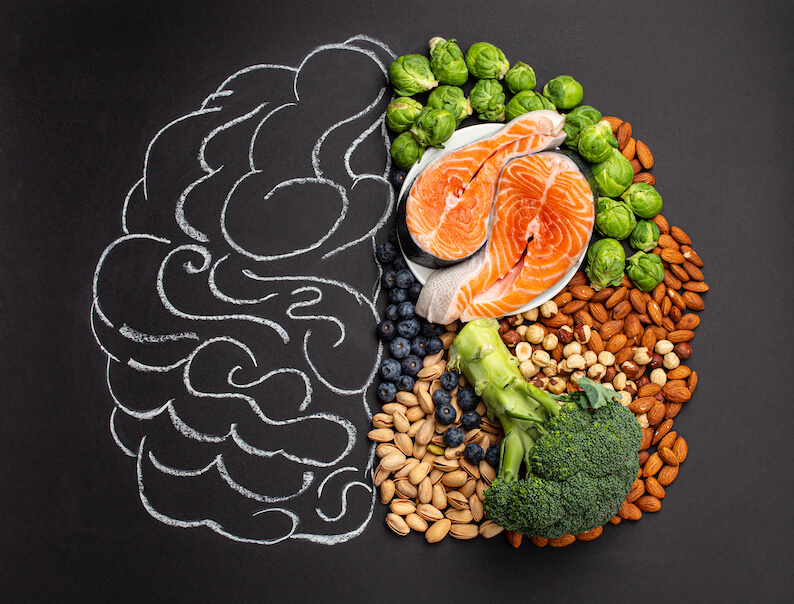
Leafy Green Salads
Start your day with a salad that includes spinach, kale or Swiss chard. These leafy greens are rich in antioxidants and vitamins that support brain health.
Kickstarting your day with a vibrant and nutritious salad featuring leafy greens like spinach, kale or Swiss chard is a smart and health-conscious choice that can set a positive tone for the rest of your day. Here’s why this morning ritual can be a game-changer for your brain health and overall well-being:
Antioxidant Power: Leafy greens are packed with antioxidants, including vitamin C, vitamin E and beta-carotene. These compounds help protect your brain cells from oxidative stress and damage caused by free radicals. Antioxidants are like natural bodyguards for your brain, keeping it in optimal working condition.
Brain-Boosting Nutrients: Leafy greens are a rich source of essential nutrients that nourish your brain. They provide folate, a B-vitamin that supports cognitive function and helps prevent cognitive decline. Additionally, the vitamin K in these greens is associated with improved memory and mental agility.
Anti-Inflammatory Benefits: Chronic inflammation has been linked to cognitive decline and various neurological conditions. Leafy greens contain anti-inflammatory compounds that can help reduce inflammation in your brain, supporting long-term brain health.
Improved Blood Flow: The nitrates in leafy greens can enhance blood flow to the brain. This increased circulation ensures that your brain receives an adequate supply of oxygen and nutrients, promoting alertness and mental clarity.
Enhanced Cognitive Function: Regular consumption of leafy greens has been linked to improved cognitive function and a lower risk of age-related cognitive decline. They can help keep your memory sharp and your thinking agile.
Fiber for Sustained Energy: Leafy greens are a great source of dietary fiber, which contributes to stable energy levels throughout the morning. You won’t experience the energy crashes associated with sugary breakfast options, allowing you to stay focused and alert.
Weight Management: Starting your day with a salad can be an effective strategy for weight management. Leafy greens are low in calories but high in volume and nutrients, helping you feel satisfied and preventing overeating later in the day.
Versatile and Delicious: Salads can be as creative and delicious as you want them to be. Experiment with various toppings like nuts, seeds, fruits and lean proteins to keep your breakfast salads exciting and full of flavor.
Hydration: Leafy greens have a high water content, contributing to your morning hydration. Staying well-hydrated is essential for maintaining cognitive function and mental alertness.
Positive Morning Ritual: Incorporating a nutritious salad into your morning routine sets a positive tone for the day. It’s a gesture of self-care and mindfulness, reminding you to prioritize your health and well-being from the moment you wake up.
Incorporating leafy greens into your morning routine is a delicious and effective way to nourish your brain, boost cognitive function and set a healthy tone for the day ahead. So, why not start your day with a brain-boosting salad? Your mind and body will thank you for it as you enjoy increased alertness, improved memory and a sense of well-being throughout the day.
If you’d like to dive deeper into this subject, there’s more to discover on this page: 11 Best Foods to Boost Your Brain and Memory

Fatty Fish Fridays
Make it a habit to enjoy a serving of fatty fish like salmon or mackerel at least once a week to boost your omega-3 intake.
Incorporating fatty fish like salmon or mackerel into your weekly meal plan is a habit that can pay remarkable dividends for your health. These fish varieties are not just delicious; they are also rich sources of omega-3 fatty acids, which are widely recognized for their numerous health benefits.
Omega-3 fatty acids are essential for optimal health and they play a crucial role in several bodily functions. By making it a habit to enjoy a serving of fatty fish at least once a week, you’re actively boosting your omega-3 intake and here’s why it matters:
Heart Health: Omega-3 fatty acids are renowned for their heart-protective properties. They have the ability to lower blood pressure, reduce triglycerides and help prevent the development of dangerous blood clots. Regular consumption of fatty fish can significantly decrease the risk of heart disease, which remains one of the leading causes of mortality worldwide.
Brain Function: Omega-3s are often referred to as “brain food” because they are integral to cognitive function. They support brain development in infants and help maintain optimal brain health throughout life. Consuming these fatty acids may reduce the risk of age-related cognitive decline and contribute to better memory and mental clarity.
Joint Health: Omega-3s possess anti-inflammatory properties, which can be particularly beneficial for individuals dealing with conditions like arthritis. They help reduce joint pain and stiffness, improving overall joint comfort and mobility.
Eye Health: These essential fatty acids are also associated with eye health, particularly in reducing the risk of macular degeneration and dry eye syndrome. Regular intake can help maintain good vision as you age.
Mood and Mental Well-being: Omega-3s have been linked to mood regulation and mental well-being. They may help reduce symptoms of depression and anxiety, offering a natural approach to emotional health.
Incorporating fatty fish into your diet can be a culinary adventure as well. Salmon, for example, can be grilled, roasted or even enjoyed in sushi. Mackerel can be smoked, baked or used in various flavorful recipes. By making this simple dietary change, you’re not only savoring delicious meals but also making a proactive investment in your long-term health. So, go ahead, let these fatty fish varieties become a delightful and healthful addition to your weekly dining routine and enjoy the benefits they bring to your overall well-being.
Looking for more insights? You’ll find them right here in our extended coverage: What Do We Know About Diet and Prevention of Alzheimer’s Disease?
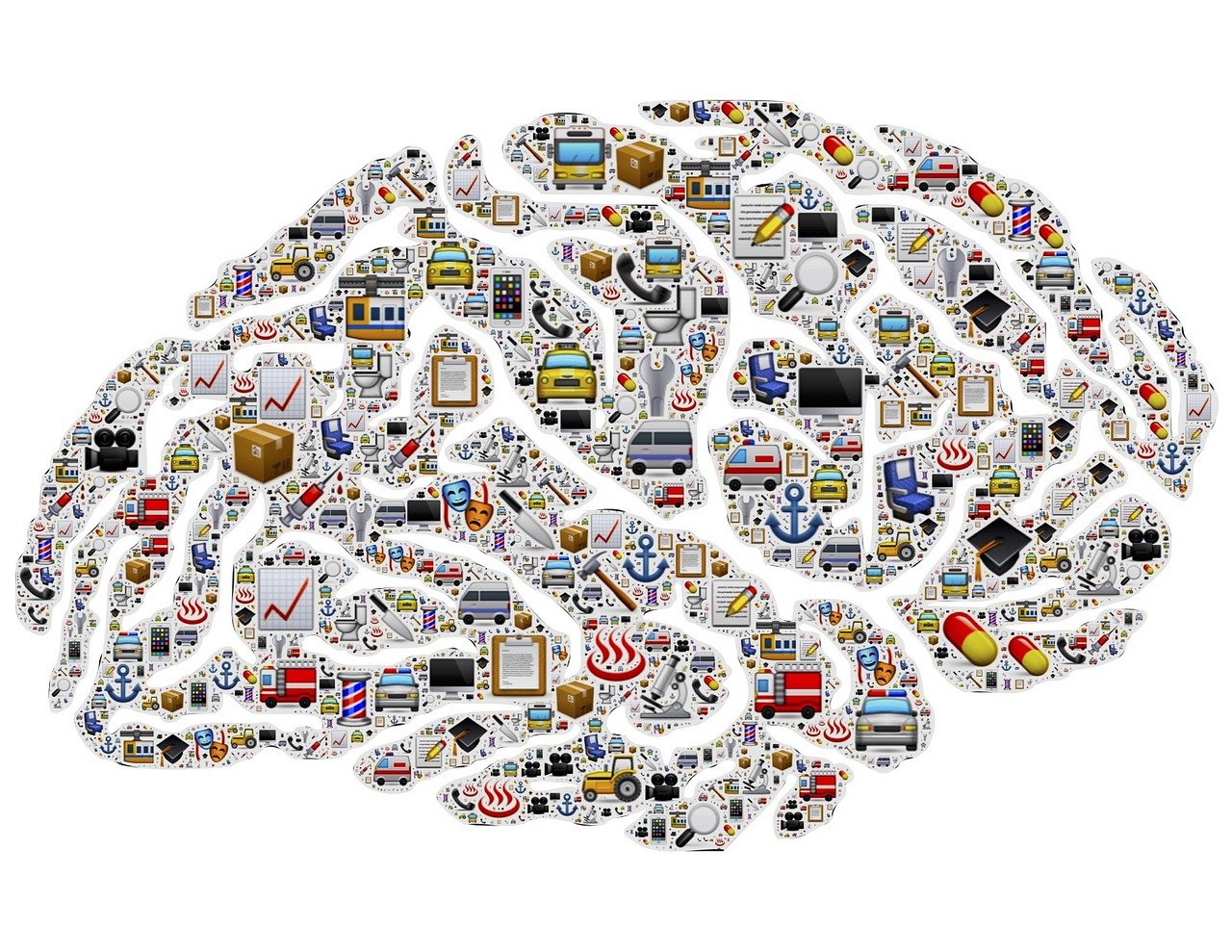
Berries Galore
Add a handful of berries, such as blueberries or strawberries, to your breakfast cereal or yogurt for a delicious antioxidant-rich kick.
Add a handful of berries, such as blueberries or strawberries, to your breakfast cereal or yogurt for a delicious antioxidant-rich kick that not only elevates the flavor but also elevates your health.
Berries are nature’s tiny powerhouses, packed with an impressive array of vitamins, minerals and disease-fighting antioxidants. When you make them a part of your morning routine, you’re not only treating your taste buds but also offering your body a burst of nutritional goodness.
Antioxidant Abundance: Berries are renowned for their high levels of antioxidants, such as anthocyanins and vitamin C. These compounds help neutralize harmful free radicals in your body, reducing oxidative stress and the risk of chronic diseases like cancer and heart disease.
Heart Health: The anthocyanins found in berries are particularly beneficial for heart health. They can help lower blood pressure, reduce bad cholesterol levels and improve overall cardiovascular function. Regular berry consumption is associated with a lower risk of heart-related issues.
Cognitive Boost: Berries, especially blueberries, have been linked to improved cognitive function. They may help protect the brain from age-related cognitive decline, keeping your mind sharp and alert.
Digestive Support: Berries are a fantastic source of dietary fiber, which is crucial for digestive health. Fiber helps regulate bowel movements, prevent constipation and support a healthy gut microbiome.
Skin Radiance: The vitamin C in berries plays a role in collagen production, which is essential for healthy, youthful-looking skin. Including berries in your diet may contribute to a more radiant complexion.
Weight Management: Berries are low in calories and high in fiber, making them an excellent choice for those looking to manage their weight. They provide a feeling of fullness, reducing the temptation for unhealthy snacking.
Versatility: Berries are incredibly versatile and can be added to a wide range of dishes. Besides cereal and yogurt, you can use them in smoothies, salads, desserts or even as a topping for pancakes or waffles.
By incorporating berries into your breakfast, you’re starting your day with a nutritional boost that can have far-reaching effects on your overall well-being. Their sweet, tart and juicy flavors make them a delightful addition to any meal. So, the next time you reach for your cereal or yogurt, don’t forget to toss in some colorful berries and savor the taste of health with every bite.
To expand your knowledge on this subject, make sure to read on at this location: The right plant-based diet for you – Harvard Health

Nutty Snacking
Choose nuts like walnuts, almonds and cashews as healthy snacks. They provide healthy fats and protein to support brain function.
Elevate your snacking game by reaching for nature’s power-packed delights—nuts like walnuts, almonds and cashews. These bite-sized wonders don’t just satisfy your taste buds; they also deliver a host of nutritional benefits that can supercharge your health and cognitive function.
Healthy Fats for Brain Health: Nuts are rich in healthy fats, particularly monounsaturated and polyunsaturated fats. These fats play a crucial role in maintaining the structural integrity of brain cells, aiding in the transmission of signals between neurons and supporting overall brain health. Omega-3 fatty acids, found abundantly in walnuts, are especially noteworthy for their cognitive benefits. They have been linked to improved memory and cognitive function.
Protein for Sustained Energy: Nuts are a source of plant-based protein, providing a steady and sustained release of energy. Protein is essential for the production of neurotransmitters, the chemical messengers that transmit signals in the brain. By incorporating nuts into your snacks, you help ensure a steady supply of amino acids, the building blocks of these neurotransmitters, which can contribute to improved mental alertness and focus.
Vitamins and Minerals: Nuts are a treasure trove of essential vitamins and minerals, including vitamin E, magnesium and zinc. Vitamin E, in particular, is a powerful antioxidant that helps protect brain cells from oxidative stress, potentially reducing the risk of cognitive decline as we age. Magnesium and zinc play roles in memory and learning, further emphasizing the brain-boosting potential of nuts.
Satiety and Blood Sugar Regulation: Nuts are renowned for their satiety factor. The combination of healthy fats, protein and fiber found in nuts can help keep hunger at bay and prevent unhealthy snacking. Additionally, they have a minimal impact on blood sugar levels, providing a stable source of energy without the sharp spikes and crashes associated with sugary snacks.
When it comes to snacking, nuts are an excellent choice, not just for their delicious flavors and satisfying crunch but also for their remarkable contribution to cognitive well-being. So, the next time you’re in need of a quick pick-me-up or a brain-boosting snack, consider keeping a handful of walnuts, almonds or cashews on hand. Your taste buds and your brain will thank you for this healthy and nutritious choice.
For a comprehensive look at this subject, we invite you to read more on this dedicated page: The Top 5 Nuts for Brain Health – A Delicious Way to Boost Your …

Whole Grain Goodness
Opt for whole grains like brown rice, quinoa and whole wheat bread to ensure a steady supply of B vitamins to your brain.
When it comes to nourishing your brain and supporting cognitive function, your choice of grains can make a significant impact. Opting for whole grains such as brown rice, quinoa and whole wheat bread is a wise dietary decision that not only provides you with sustained energy but also ensures a consistent supply of essential B vitamins for your brain health.
1. B Vitamins for Brain Vitality: The B vitamins, a group of water-soluble nutrients, are essential for the proper functioning of your brain and nervous system. They play crucial roles in energy production, neurotransmitter synthesis and the maintenance of healthy nerve cells. Among the B vitamins, folate (B9), vitamin B6 and vitamin B12 are particularly important for cognitive health.
Folate (B9): Folate supports brain development and function by participating in the synthesis of neurotransmitters like serotonin, which regulates mood and dopamine, which influences motivation and pleasure. It also helps reduce levels of homocysteine, an amino acid linked to cognitive decline and neurodegenerative diseases.
Vitamin B6: Vitamin B6 is involved in the production of neurotransmitters, including serotonin and dopamine. It also plays a role in the formation of hemoglobin, which carries oxygen to the brain.
Vitamin B12: Vitamin B12 is essential for the maintenance of nerve cells and the synthesis of myelin, a protective sheath around nerve fibers. A deficiency in vitamin B12 can lead to cognitive impairments and memory problems.
2. Whole Grains as a B Vitamin Source: Whole grains like brown rice, quinoa and whole wheat bread are excellent sources of B vitamins, particularly folate, vitamin B6 and small amounts of vitamin B12 in the case of fortified products. When you choose whole grains over refined grains, you’re ensuring a more consistent intake of these vital nutrients.
3. Sustained Energy and Mental Clarity: Whole grains also provide a steady supply of complex carbohydrates, releasing glucose gradually into your bloodstream. This sustained energy supply helps maintain mental clarity and focus throughout the day, preventing the energy crashes associated with simple carbohydrates.
Incorporating whole grains into your diet not only supports your brain health but also contributes to overall well-being. These grains offer a delightful range of flavors and textures, making them versatile additions to your meals. From a comforting bowl of brown rice to a nourishing quinoa salad or a hearty sandwich on whole wheat bread, you have a plethora of delicious options to choose from. So, when it comes to feeding your brain and nurturing your cognitive abilities, make whole grains a staple in your diet and enjoy the mental rewards of this nutritious choice.
To expand your knowledge on this subject, make sure to read on at this location: Foods linked to better brainpower – Harvard Health

Egg-cellent Breakfasts
Eggs are an excellent source of choline, a nutrient that supports memory and brain health. Include eggs in your breakfast rotation.
Eggs, those breakfast staples, offer much more than just a delicious start to your day. Let’s delve deeper into why they deserve a prominent place in your breakfast rotation:
1. Choline for Brain Health: Choline, a nutrient found abundantly in eggs, is a cognitive champion. It plays a crucial role in the development and maintenance of memory and brain function. Regular consumption of choline-rich foods like eggs can enhance memory retention and cognitive performance, making them an ideal choice to kickstart your day with mental clarity.
2. Sustained Energy: Eggs are a protein powerhouse, delivering a steady and long-lasting source of energy. Protein helps you feel full and satisfied, preventing mid-morning energy crashes and unnecessary snacking. This sustained energy is especially beneficial for those who need focus and productivity in the morning.
3. Nutrient Density: Eggs are a nutritional treasure trove. In addition to choline and protein, they contain essential vitamins like B12, riboflavin and folate, which contribute to overall health. Eggs are also a source of minerals like selenium, which supports immune function and acts as an antioxidant.
4. Versatility in the Kitchen: Eggs are incredibly versatile and can be prepared in numerous ways to suit your taste and dietary preferences. Whether you prefer them scrambled, poached, boiled or in an omelette, eggs can be customized to your liking.
5. Satiety and Weight Management: The combination of protein and healthy fats in eggs provides a sense of fullness that helps curb overeating throughout the day. This satiety factor makes eggs a valuable ally in weight management and can support your efforts to maintain a healthy body weight.
6. Essential Amino Acids: Eggs are a complete protein source, meaning they contain all nine essential amino acids the body needs for optimal function. This makes them an excellent choice for muscle repair, growth and overall well-being, particularly for those with active lifestyles.
7. Heart Health: Contrary to earlier concerns, research has shown that moderate egg consumption does not significantly impact heart health for most people. In fact, eggs can contribute to healthy cholesterol levels and reduce the risk of heart disease when part of a balanced diet.
8. Affordable and Accessible: Eggs are budget-friendly and widely available, making them an accessible source of high-quality nutrition for individuals of all backgrounds.
Incorporating eggs into your breakfast rotation not only provides a delicious and satisfying start to your day but also supports memory and brain health, sustained energy and overall well-being. Whether enjoyed on their own or as part of a well-rounded breakfast, eggs are a versatile and nutrient-rich addition to your morning routine.
Should you desire more in-depth information, it’s available for your perusal on this page: Nourish Your Noggin with These 5 Brain Foods — Memphis …

Hydration Matters
Stay hydrated by drinking plenty of water throughout the day. Even mild dehydration can impair cognitive function.
Staying adequately hydrated is not just a matter of quenching your thirst; it’s a fundamental pillar of overall well-being, including cognitive function. Here’s an extended perspective on the importance of hydration and how it directly affects your mental prowess:
The Brain’s Thirst for Water: Your brain is highly sensitive to changes in hydration levels. It’s estimated that the brain is composed of about 75% water. When you become dehydrated, even mildly so, this water balance is disrupted. Consequently, your brain may temporarily shrink in volume, which can lead to symptoms such as headaches, difficulty concentrating and memory lapses.
Cognitive Clarity: Optimal hydration is essential for maintaining cognitive clarity and sharpness. When you’re well-hydrated, your brain cells function at their best, facilitating efficient neurotransmission and the processing of information. This means that you can think more clearly, stay focused and make sound decisions.
Memory and Learning: Hydration plays a pivotal role in memory and learning processes. When you’re adequately hydrated, your brain’s hippocampus, a region critical for memory consolidation and information retrieval, functions optimally. This means you’re more likely to remember important facts and grasp new concepts effectively.
Sustained Attention: Dehydration can lead to a decline in attention span and vigilance. If you find it challenging to stay engaged in tasks or remain alert during meetings or classes, it’s possible that inadequate hydration is a contributing factor. Ensuring proper hydration can help you maintain sustained attention and productivity.
Mood Regulation: Dehydration can also affect your mood. Research suggests that even mild dehydration can lead to feelings of irritability and anxiety. Proper hydration helps stabilize mood and can contribute to an overall sense of well-being.
Physical and Mental Fatigue: Dehydration can lead to physical fatigue, but it also plays a role in mental fatigue. When you’re dehydrated, your brain has to work harder to perform cognitive tasks, leading to a sense of mental exhaustion.
Preventing Dehydration: To prevent dehydration and its impact on cognitive function, make it a habit to drink water throughout the day. The recommended daily intake varies but is often around 8-10 cups (64-80 ounces) for adults. Adjust your intake based on factors like activity level, climate and individual needs.
In summary, staying hydrated is not just about quenching your physical thirst; it’s about nourishing your brain and supporting your cognitive abilities. Even mild dehydration can impair cognitive function, affecting your memory, attention, mood and overall mental clarity. Prioritizing proper hydration as part of your daily routine is a simple yet powerful way to keep your mind sharp, focused and functioning at its best.
Should you desire more in-depth information, it’s available for your perusal on this page: B Vitamins and the Brain: Mechanisms, Dose and Efficacy—A …
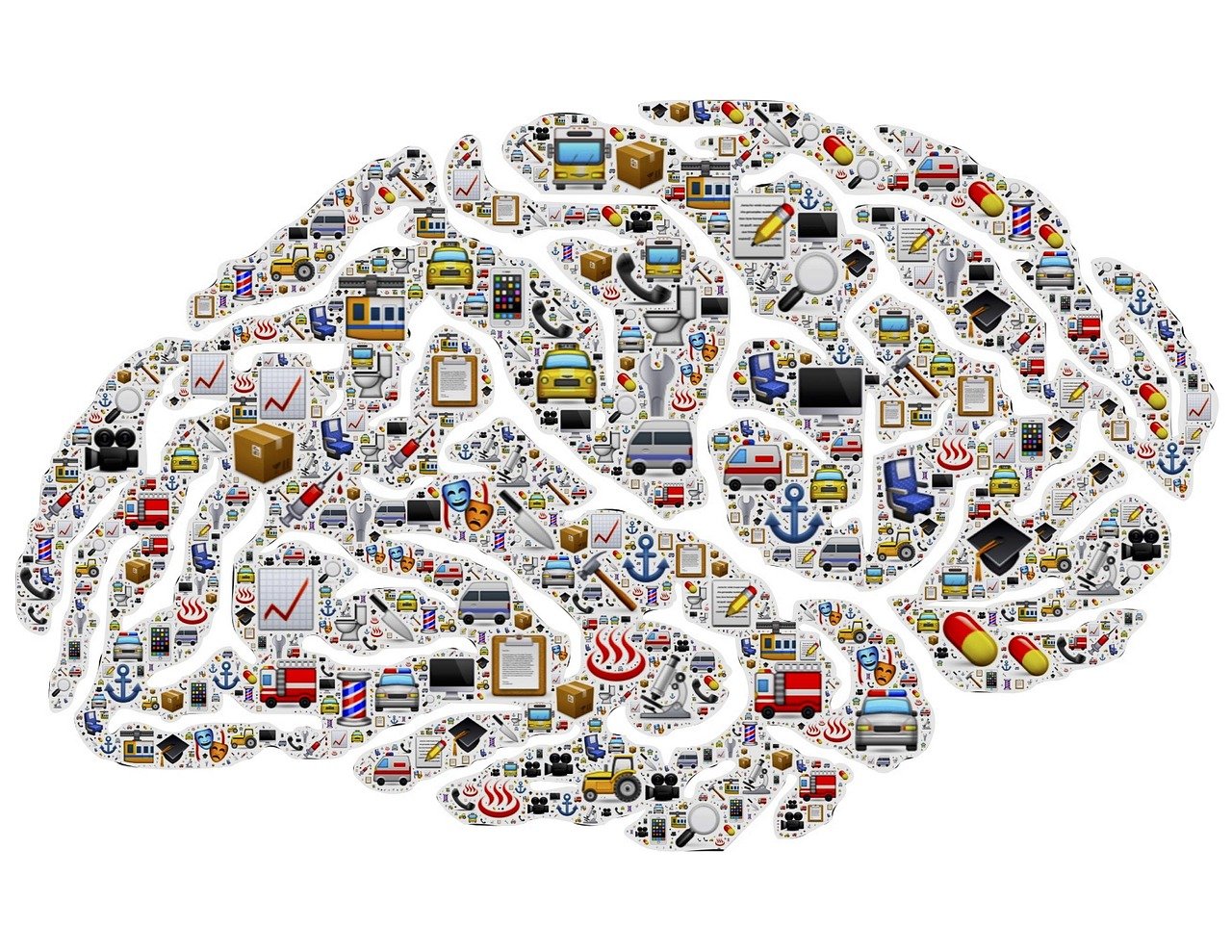
A Holistic Approach to Brain Health
While brain-boosting foods are a valuable part of maintaining cognitive function, it’s essential to remember that a holistic approach to brain health is key. Adequate sleep, regular physical activity, mental stimulation and stress management all contribute to a sharp and agile mind. By combining these lifestyle factors with a brain-boosting diet, you can empower yourself to enjoy a life filled with mental clarity, focus and cognitive vitality.
Indeed, brain-boosting foods are like the foundation of a sturdy building when it comes to maintaining cognitive function. However, it’s crucial to recognize that true brain health is a holistic endeavor. A well-rounded approach, encompassing various facets of our lifestyle, is the key to unlocking the full potential of our minds.
One of the pillars of this holistic approach is adequate sleep. Sleep is when our brains consolidate memories, repair and regenerate cells and clear away toxins that accumulate throughout the day. It’s the time when our cognitive processes are fine-tuned for the challenges of the coming day. Ensuring that you consistently get enough restorative sleep not only supports memory and cognitive function but also helps you wake up with mental clarity and alertness.
Regular physical activity is another critical component of brain health. Exercise increases blood flow to the brain, promotes the release of neuroprotective chemicals and encourages the growth of new brain cells. Whether it’s a brisk walk, a dance class or a session of yoga, incorporating physical activity into your routine can significantly enhance cognitive vitality and reduce the risk of age-related cognitive decline.
Mental stimulation is also essential for keeping the brain agile. Just as muscles need regular exercise to stay strong, our brains thrive on challenges. Engaging in activities that stimulate critical thinking, problem-solving and creativity, such as puzzles, reading or learning a new language, can help maintain cognitive function and even improve it over time.
Stress management is yet another crucial aspect of a holistic approach to brain health. Chronic stress can have detrimental effects on the brain, impairing memory and cognitive function. Techniques like meditation, deep breathing exercises and mindfulness can help reduce stress and promote mental clarity.
By combining these lifestyle factors with a brain-boosting diet, you create a powerful synergy that empowers you to enjoy a life filled with mental clarity, focus and cognitive vitality. It’s like creating a symphony where each component plays a unique but harmonious role in preserving and enhancing your most precious asset—your mind.
So, remember that while brain-boosting foods are essential, the holistic approach to brain health is the key to unlocking your cognitive potential and ensuring a life rich with mental sharpness and agility. By nurturing your brain with a balanced diet, quality sleep, physical activity, mental stimulation and effective stress management, you can embark on a lifelong journey toward greater cognitive well-being and a brighter, more fulfilling future.
To expand your knowledge on this subject, make sure to read on at this location: Choline – Health Professional Fact Sheet

More links
Looking for more insights? You’ll find them right here in our extended coverage: 12 Foods to Boost Brain Function
